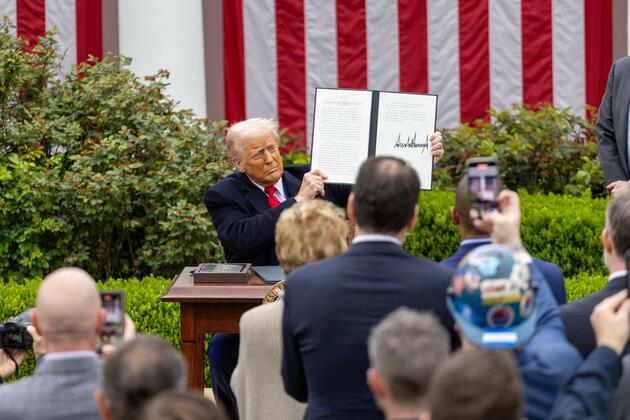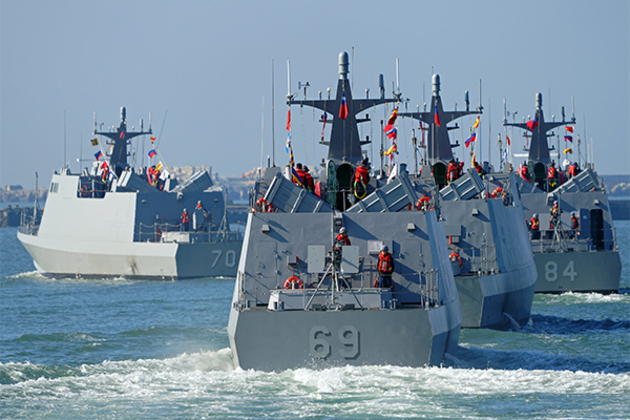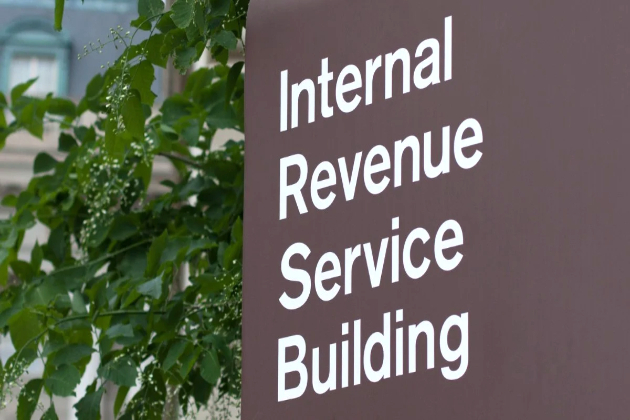Xinhua Commentary: Trump's "reciprocal tariffs" a manifestation of Washington's modern-day piracy
Xinhua
10 Apr 2025, 13:15 GMT+10

Beneath Washington's relentless trade practices lies a deeper truth: the enduring legacy of a piratical past, now institutionalized as policy and disguised in rhetoric of fairness, rules and security.
BEIJING, April 10 (Xinhua) -- U.S. President Donald Trump last week unveiled the so-called "reciprocal tariffs" on most trading partners, claiming that the move, which has triggered significant global market volatility and fueled concerns about a potential recession, would make the world's largest economy "wealthy again."
Beneath Washington's relentless trade practices lies a deeper truth: the enduring legacy of a piratical past, now institutionalized as policy and disguised in rhetoric of fairness, rules and security.
Washington's trade aggression has deep roots in imperial history. In the 16th and 17th centuries, Britain's rise to global power was fueled by privateers -- state-sanctioned pirates authorized by royal "letters of marque" to attack rival ships and colonies. These licensed raids funded naval expansion, disrupted Spanish dominance, and paved the way for English colonization in the Americas.
The passengers aboard the Mayflower in 1620 -- often mythologized as spiritual refugees -- were, in reality, the first English colonists in North America, deeply embedded in Britain's expanding imperial enterprise. Their so-called "city upon a hill" was built on violently seized land, justified through scripture and sustained by relentless extraction. What began as maritime piracy gradually evolved into a settler-colonial model that blended conquest with moral justification.
That fusion, or confusion, persists today. In the modern era, U.S. foreign and trade policy still reflects this "pirate ethic" -- a kind of narrative alchemy that transforms plunder into providence, aggressors into guardians, and competitors into existential threats.
From the 1985 Plaza Accord, which forced Japan to sharply revalue the yen, triggering the collapse of its economic boom and ushering in the "lost decades," to the structural adjustment programs imposed on Latin American countries following their 1980s debt crisis, Washington has routinely wielded economic leverage to extract concessions. It posed as a partner but operated like a modern pirate, dragging weaker nations to the negotiating table under terms already decided.
Trump repeated the playbook. While claiming "for decades our country has been looted, pillaged and raped," he framed the new tariffs as an act of restraint, claiming, "We are being very kind," as if the United States, a superpower wielding a stick, is the one being beaten.
This reflex -- feeling threatened even while in a dominant position -- is deeply rooted in a pirate ethos shaped by fear and perpetuated by a perpetual sense of being under siege. As French political scientist Dominique Moisi noted, U.S. foreign policy is steeped in fear: fear of decline, of competition, and of losing primacy.
This fear fosters a zero-sum worldview, where the rise of any other nation is, by default, perceived as a loss for the United States. Even its allies are not exempt from this mentality.
In 1987, Japan's Toshiba was sanctioned by Washington for selling precision tools to the Soviet Union, citing "national security." In 2014, France's Alstom was prosecuted under U.S. anti-corruption laws and was subsequently pressured to sell its energy division to General Electric. Between 2019 and 2021, Washington imposed sanctions on European firms tied to Nord Stream 2, undermining the continent's energy autonomy.
China, seen as a long-term competitor by the United States, has faced a far more systematic and expansive range of coercive measures, including tariffs on billions of dollars' worth of goods under Section 301, export controls targeting critical technologies like semiconductors, investment bans on firms deemed "national security threats," and sweeping sanctions on Chinese tech firms. Although each measure is justified as a matter of national security or fair competition, the underlying motive is simply to contain an imaginary adversary.
After World War II, the United States initially positioned itself as a trustworthy power. Some countries, believing in its promises, tied their futures to the system Washington claimed to defend.
However, war, coercion, blame and extraction, once exceptions, transitioned to the norm over time. Eventually, the mask slips, and the narrative no longer holds. The United States is nearing that tipping point.
 Share
Share
 Tweet
Tweet
 Share
Share
 Flip
Flip
 Email
Email
Watch latest videos
Subscribe and Follow
Get a daily dose of Bristol Star news through our daily email, its complimentary and keeps you fully up to date with world and business news as well.
News RELEASES
Publish news of your business, community or sports group, personnel appointments, major event and more by submitting a news release to Bristol Star.
More InformationUnited Kingdom
SectionJaguar Land Rover halts US exports amid new tariffs
LONDON, U.K.: Jaguar Land Rover has become one of the first major carmakers to pause exports to the United States in response to the...
Billionaire Kretinsky clears final hurdle in Royal Mail takeover
LONDON, U.K.: Daniel Kretinsky's path to owning Royal Mail is nearly complete, as his firm EP Group announced this week that all regulatory...
Xinhua Commentary: Trump's "reciprocal tariffs" a manifestation of Washington's modern-day piracy
U.S. President Donald Trump shows an executive order on reciprocal tariffs at the Rose Garden of the White House in Washington, D.C.,...
China's ceramic "DNA lab" cracks Dutch collector's porcelain cold case
Photo taken on June 8, 2022 shows a staff member displaying gene specimens of ceramics from the Ming Dynasty (1368-1644) at Jingdezhen...
Taiwan detects 11 Chinese aircraft sorties, six naval vessels near its territory
Taipei [Taiwan], April 10 (ANI): Taiwan's Ministry of National Defence (MND) detected 11 sorties of People's Liberation Army (PLA)...
Harry Brook puts country first, ready to lead England's white-ball revival
London [UK], April 10 (ANI): Harry Brook has made it clear that no amount of money will stand in the way of his commitment to leading...
International
SectionDeadly storms flood Kentucky, pose threat to lives, homes
FRANKFORT, Kentucky: Heavy rain over several days caused rivers to overflow across Kentucky, flooding homes and threatening a famous...
Ukraine, US resume talks on critical minerals deal
KYIV, Ukraine: Talks between Ukraine and the United States over a critical minerals agreement are set to continue this week, as officials...
SpaceX, ULA, Blue Origin win $13.5 billion in space force contracts
WASHINGTON, D.C.: Elon Musk's SpaceX, Jeff Bezos' Blue Origin, and United Launch Alliance (ULA) won U.S. military contracts worth US$13.5...
IRS begins major layoffs, civil rights office hit first
WASHINGTON, D.C.: The U.S. Internal Revenue Service (IRS) began laying off workers late last week, according to an email sent to staff,...
Civilians and Hostages Face Starvation and Continuous Bombardment
GAZA STRIP - As the conflict in Gaza intensifies, the humanitarian crisis has reached unprecedented levels. The death toll has risen...
Georgia Senate passes bill to ban DEI programs in schools and colleges
ATLANTA, Georgia: Georgia senators ended the 39th day of their 2025 session this week by approving a bill that would ban diversity,...












